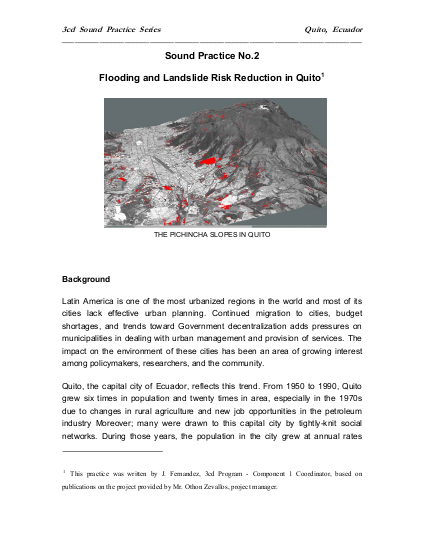
Latin America is one of the most urbanized regions in the world and most of its cities lack effective urban planning. Continued migration to cities, budget shortages, and trends toward Government decentralization adds pressures on municipalities in dealing with urban management and provision of services. The impact on the environment of these cities has been an area of growing interest among policymakers, researchers, and the community. Quito, the capital city of Ecuador, reflects this trend. From 1950 to 1990, Quito grew six times in population and twenty times in area, especially in the 1970s due to changes in rural agriculture and new job opportunities in the petroleum industry Moreover; many were drawn to this capital city by tightly-knit social networks. During those years, the population in the city grew at annual rates between 1.3% and 3.4%. Because of this rapid urbanization and a limited housing supply, Quito's working class residents and migrants were forced in the late 1970s and early 1980s to settle on lands on the periphery of Quito and mainly on the steep slopes of Mt. Pichincha, which bounds the city to the west. Many residents formed housing cooperatives and purchased property from land speculators. Sometimes, they invaded agricultural lands surrounding the city and forced the owners to sell. Most of these neighbourhoods were declared illegal and they could barely get basic services. In other cases, they occupied the high and steep slopes of the mountains around the city, where provision of water, for example, was impossible. The forest has been progressively destroyed, leading to environmental degradation that has triggered successive natural disasters associated with landslides and flooding.
Resource collections
- UN Habitat - Urban Response Collection
- Urban Response - Urban Crisis Preparedness and Risk Reduction
- Urban Response Collection - Community Engagement and Social Cohesion
- Urban Response Collection - Economic Recovery
- Urban Response Collection - Environment and Climate Change
- Urban Response Collection - Housing, Land and Property
- Urban Response Collection - Urban Crisis Response, Recovery and Reconstruction
- Urban Response Collection - Urban Resilience